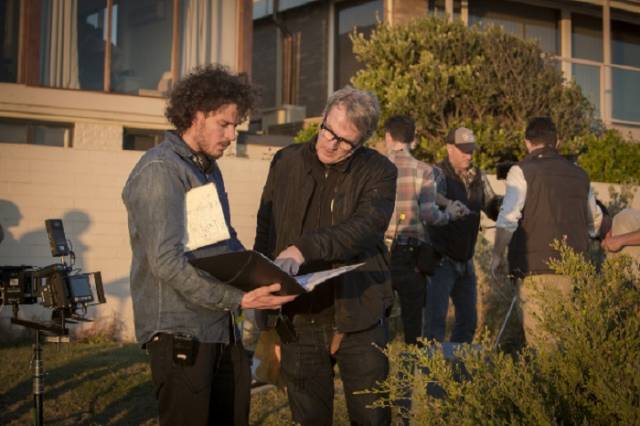
 Real life stories about characters who overcome the odds to succeed and inspire audiences are a Hollywood staple, but they’re rarely done with the artistry and pragmatism of Lion. Garth Davis’ feature length debut which tells the story of Saroo, an Indian boy who gets lost at age 5, and is adopted by an Australian couple who take him to Tasmania, where decades later thanks to new technology he begins to search for his biological family. Filled with incredible performances by Dev Patel, Nicole Kidman, and newcomer Sunny Pawar (who plays Saroo as a child), Lion is also notable for its pithy screenplay, the work of Luke Davies who took Saroo Brierley’s autobiography and turned it into a soulful mystery. The film was nominated for six Academy Awards including one for Davies’ screenplay - “it’s a pretty pleasant feeling, but surreal”, he explained of the nomination when we sat down to discuss the film in New York City. Davis also spoke about how he infuses his screenplays with poetry, and the challenges of writing someone else’s story while remaining true to his art.
Real life stories about characters who overcome the odds to succeed and inspire audiences are a Hollywood staple, but they’re rarely done with the artistry and pragmatism of Lion. Garth Davis’ feature length debut which tells the story of Saroo, an Indian boy who gets lost at age 5, and is adopted by an Australian couple who take him to Tasmania, where decades later thanks to new technology he begins to search for his biological family. Filled with incredible performances by Dev Patel, Nicole Kidman, and newcomer Sunny Pawar (who plays Saroo as a child), Lion is also notable for its pithy screenplay, the work of Luke Davies who took Saroo Brierley’s autobiography and turned it into a soulful mystery. The film was nominated for six Academy Awards including one for Davies’ screenplay - “it’s a pretty pleasant feeling, but surreal”, he explained of the nomination when we sat down to discuss the film in New York City. Davis also spoke about how he infuses his screenplays with poetry, and the challenges of writing someone else’s story while remaining true to his art.
When you introduce yourself to people, do you tell them you’re a writer, a novelist, a poet or a screenwriter?
I say I’m a writer because I still feel that. The center of my identity is me as a poet, the thing that doesn’t make me any money because nobody reads poetry, my novels too but I haven’t had one published in six years. So yeah, I say I’m a writer, if people want more details I say novels, screenplays…
Does the novelist think different than the poet?
Definitely. Ultimately there’s a thread that hopefully the poet Luke can put a kind of poetry in my screenplays, a sense of something elevated, that if you’re reading the Lion screenplay and you’re a financier you feel that the movie can be beautiful and moving. On the other hand a screenplay is a very technical document with a set of rules that can make what you do quite narrow, it’s a communication document, a blueprint for something that will move away from you towards a director’s vision. You can’t mess around with it too much, while in a poem no one’s telling you whether to write a sonnet or couplets, it’s all about instincts. Screenplays are more dry and formal that way.
Does being bound to the form help you write?
I think the more bound I am, the better. Even in my poetry, I’m quite formalist as a poet.
I read the “Totem Poem” after watching Lion and there was a line in which was something like “you came suddenly into my life and I liked it”...
That’s very close, it’s “you came into my life really fast and I liked it”.

Yes, that line made me think so much about the relationship between Saroo and Lucy. Did this poem specifically come into play when you wrote the screenplay?
That’s a beautiful notion. You’re actually talking about something that broke my heart a little because of time and compression problems, I tried to write this gorgeous, juicy love affair that explodes into their lives, first seen through the attraction and chemistry they have in the hotel school. In fact they shot one scene, it’s magnificent and it’s not in the movie, they go to a party at a warehouse, they start dancing and it’s the first time their faces are grazing each other. It’s the beginning of something, and that is strongly a moment of “you came into my life really fast and I liked it”. It’s such a shame that it had to go, also because it gave these two pillars to their relationship, they fall in love before the first time they make love which is what we see in the movie. Then she tries to make him dance later in the movie, when their relationship is falling apart, so the dancing/not dancing scene had beautiful symmetry. Shame it had to go.
Maybe it’ll be in the DVD!
I hope so!
There were three real life “Lucys” so the character you created is also sort of a totem in a way, composed of all of them.
Yeah, dating the real Saroo must have been maddening and infuriating, the movie makes you think it was a two year situation, but it was at least five for him. We compressed it, there were relationships in between and girlfriends felt he was absent from the relationship. In the earliest drafts we had two girlfriends, but it got so dense and complex, you had to had a relationship breakdown which takes valuable screenplay real estate so to speak. We tried it, but removing one would make the story less crowded, it would also allow the producers to cast one big actress, rather than two. There was enough going on in Saroo’s story that relationships would’ve distracted rather than enhanced the story. The real story is the reunification of the mother and family.
The very first scene in the movie is so striking and beautiful that it does feel like poetry. I’m assuming you want your words to be represented visually as best as possible. Is your work in this case closer to DP Greig Fraser or the director? Or do you guys work as a trinity?
It’s an absolute trinity. Greig and Garth are incredibly close friends, they have been making stuff together since they were in their early 20s, both of their careers come from a place where they were doing the tiniest things for virtually no money. Their relationship is incredibly strong, but I knew from very early on it was going to be Greig, whose work I greatly admire, so I got to dream big. I wrote paragraphs which are like prose poems where I try to give this sense of a soaring visual poem that’s setting up our worlds, the fields, the butterflies, the aerial shots, we always knew the aerial shots would become more important than in other movies because they would interweave with the Google Earth aerials. The first 50 pages of the script aren’t dialogue heavy, there’s stretches where I’m trying to describe what’s going on in the landscape, when Saroo gets lost I try to explain what the experience is like for a child this big, who runs into a hostile world with danger around each corner.
 This is your third screenplay based on a true story…
This is your third screenplay based on a true story…
I didn’t intend to.
You wrote Life, Candy which is autobiographical, and Lion. When you’re telling someone else’s story do you feel you have less liberty than you did when you wrote Candy? Or writing Saroo do you realize you ended up putting so much of you in him without realizing it?
The Candy experience is unique in that I only lived one life, I took ten years and turned them into an autobiographical novel, and I adapted them into a screenplay that was less autobiographical. It was my first screenplay too so I had no idea what I was doing, the first draft of Candy was wall-to-wall Goodfellas style, because that’s what everybody wrote, it was filled with voiceovers that I lifted from the novel. Our Saroo is very soulful, he’s quite a poet I think, the real Saroo is more high speed and social, he’s very charismatic, he’s slightly more extroverted than the one Dev portrays. I’m definitely more introvert-y than extrovert-y, but ultimately I felt the responsibility to capture the real Saroo and his amazing story, and the intensity of his passion.
I want to ask you about the scene with Sue’s vision, because as I’ve discussed the film with other people it seems to be the scene they love or loathe. Some people feel it’s a very movie-like speech, they don’t believe anyone would’ve said anything like that in real life. I disagree with them, because I think perhaps because of movies and books, we sometimes utter lines that are so poetic and beautiful. When you’re turning artful moments into movie scenes, do you feel the need to remove that already artful layer in order to make them seem less trite onscreen?
It’s amazing because in that scene I was one of those people who felt people didn’t talk like that in real life and I said to Garth “the vision of the brown child has to go, the scene will be stronger if we only use the part where she says they chose to have him, and then we jump straight to the end where she cries and says ‘this family is falling apart’”. Garth said “no, mate, this one’s not negotiable, the vision happened to Sue and it’s amazing, so it’s in”. I told him it didn’t matter the vision happened or she claimed it did happen, it felt too hippie-ish and too much like a movie speech. Garth said he believed Sue and that I had to write this scene. I didn’t want to, but he gave me no choice, he said “you have to write it and make it good”. So it was important for me to get the feeling when she says “I could feel my future coming”, because the amazing thing I learned after I wrote the script (otherwise it would’ve been in that scene) is that Sue was 17 when she married John, and they had that sense of destiny as a married couple from the very beginning, they wanted to adopt a child, not to have their own. Australian law back then said to adopt you had to prove infertility, and they couldn’t prove it, so they waited 16 years until she was in her early 30s for Australian law to change. Once that happened they immediately began the adoption process. If you think about it in those 16 years Saroo was born, lived in his town for 5 years, got lost on the train and wound up in this new life, he literally collided with Sue and John. If I had known this before, I’d included something in that scene along the lines of “your father and I got married when we were 17…”, but Sue told me on the night of our New York premiere a few months ago. I wish she had told me when I had my tape recorder (laughs), but it proves what beautiful people they are. It’s incredible to think a 17-year-old and a 20-year-old newlywed couple can make a decision like that and stick to it, to create such a beautiful family.
Lion is now in theaters.